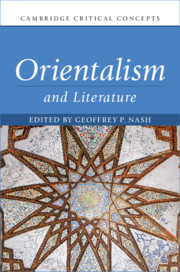Book contents
- Orientalism and Literature
- Cambridge Critical Concepts
- Orientalism and Literature
- Copyright page
- Contents
- Contributors
- Acknowledgments
- Introduction
- Part 1 Origins
- Chapter 1 Styles of Orientalism in the Eighteenth Century
- Chapter 2 The Origin and Development of the Oriental Tale
- Chapter 3 Romantic Orientalism and Occidentalism
- Chapter 4 The Victorians: Empire and the East
- Chapter 5 Orientalism and Victorian Fiction
- Chapter 6 Orientalism and Race: Aryans and Semites
- Chapter 7 Orientalism and the Bible
- Part II Development
- Part III Application
- Further Reading
- Index
Chapter 2 - The Origin and Development of the Oriental Tale
from Part 1 - Origins
Published online by Cambridge University Press: 01 November 2019
- Orientalism and Literature
- Cambridge Critical Concepts
- Orientalism and Literature
- Copyright page
- Contents
- Contributors
- Acknowledgments
- Introduction
- Part 1 Origins
- Chapter 1 Styles of Orientalism in the Eighteenth Century
- Chapter 2 The Origin and Development of the Oriental Tale
- Chapter 3 Romantic Orientalism and Occidentalism
- Chapter 4 The Victorians: Empire and the East
- Chapter 5 Orientalism and Victorian Fiction
- Chapter 6 Orientalism and Race: Aryans and Semites
- Chapter 7 Orientalism and the Bible
- Part II Development
- Part III Application
- Further Reading
- Index
Summary
It is tempting to cite the so-called Grub Street edition of the Arabian Nights’ Entertainments, translated from Antoine Galland’s Les mille et une nuits between ca. 1706 and 1721, as a primary point of origin for the amorphous genre of eighteenth-century prose fiction often referred to as “the Oriental tale.” The Arabian Nights is famously premised on the idea of an uncontainable narrative proliferation, as Princess Scheherazade tells story after story in order to save her life, and in the early eighteenth century it generated further story-cycles organized around frame narratives that conjure up analogous kinds of foundational scenario – Persian Tales (1714), Tartarian Tales (1716), Chinese Tales (1725) and Mogul Tales (1736), to name but a few. The Nights offered rich inspiration to a wide range of eighteenth-century writers, not least because it was itself a compendious textual composite, constituted by processes of interpolation and redaction as well as translation. Some of its best-known stories, including those of Aladdin and Ali Baba, may actually have been authored by Galland himself, and one aspect of the history of the Oriental tale in English that I will address in this chapter concerns the form’s initial reliance on, then increasing rejection (or occlusion) of, French cultural mediation. The Nights’ stories can variously be seen to “reveal the Orient” and to open “infinite possibilities of fantastic invention and fabrication,” as Marina Warner has argued, and in what follows I will focus in particular on the way in which the association of the form both with exotic customs and manners and with enchantment and magic allowed the Oriental tale to pull and be pulled in different directions across the period.
- Type
- Chapter
- Information
- Orientalism and Literature , pp. 50 - 65Publisher: Cambridge University PressPrint publication year: 2019



